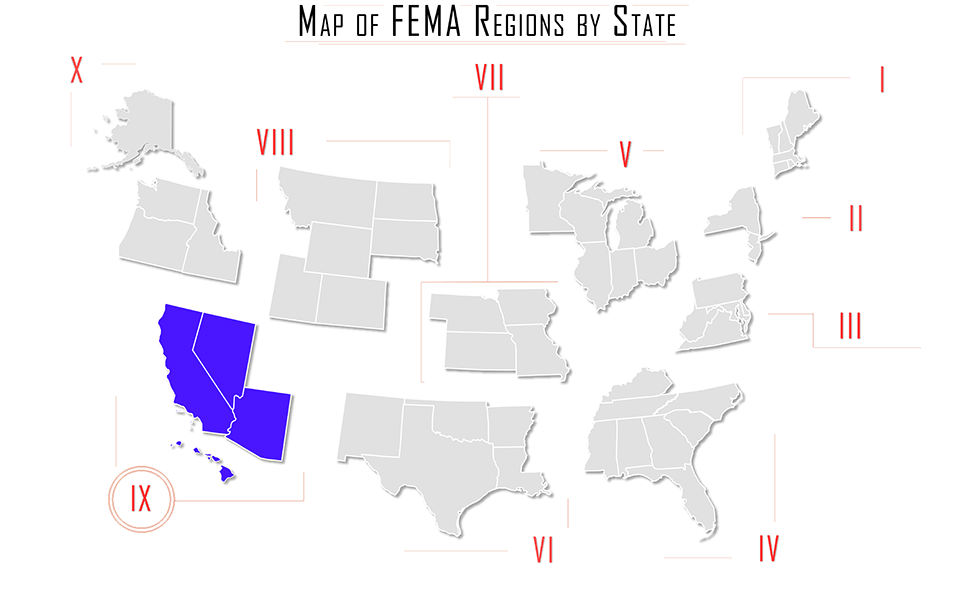.png)
At the Region is an ongoing feature that discusses the state-by-state training, certification and employment requirements of first responder departments across the nation. In this issue, At the Region begins by looking at law enforcement requirements in the western United States, including Arizona, California, Nevada, and Hawaii. Stay tuned for Region IX coverage of EMS and Fire Department regulations.

FEMA Region IX - Law Enforcement Officers (LEO)
Law enforcement includes an extremely diverse range of agencies dedicated to promoting safety and public order through the application of national and regional laws and regulations. The variation of laws and penalties nationally and internationally necessitates region-specific training and specialization, while at the same time, officers must be familiar with overarching legislation and judicial decisions governing procedure and jurisdictional reach. This applies to agencies at the federal, state, county, and municipal levels, all of whom serve and protect their constituency in a dangerous field that exists within a complex and challenging framework.
Arizona
 Arizona requires that the Peace Officer Standards and Training (AZPOST) Board certify all law enforcement officers in Arizona, except those employed by a sheriff’s department. This currently extends to approximately 170 law enforcement agencies employing more than 15,000 peace and 9,000 correctional officers. The minimum qualifications required to apply as a peace officer are defined in Chapter 4 of Title 13 in the Arizona Administrative code, and state that an applicant must:
Arizona requires that the Peace Officer Standards and Training (AZPOST) Board certify all law enforcement officers in Arizona, except those employed by a sheriff’s department. This currently extends to approximately 170 law enforcement agencies employing more than 15,000 peace and 9,000 correctional officers. The minimum qualifications required to apply as a peace officer are defined in Chapter 4 of Title 13 in the Arizona Administrative code, and state that an applicant must:
• Be a US citizen;
• Have a high school diploma or have passed a GED examination;
• Be able to pass a background check and medical examination;
• Read and affirm the code of ethics as provided by in Subsection (F) of that chapter.
Applicants may not submit directly to AZPOST for certification, and must first be hired by a law enforcement department, which will conduct agency, physical ability, and psychological testing; oral boards; a background check; polygraph; and medical examination. If an applicant is hired, the hiring agency will submit a state-approved packet and information to be verified to AZPOST, which then provides an audit before approval.
To complete the certification process, newly employed officers will be enrolled by their agency in a POST-approved academy to complete the Basic Peace Officer Course; this involves a minimum of 585 hours of training, as well as a comprehensive Final Examination. Some academies may offer attendance to qualified applicants not yet employed by an Arizona department; however, the applicant is not certified as a peace officer until they have been hired and approved by AZPOST.
Reciprocity
Peace officers certified by another state or federal agency may be eligible for AZPOST certification through Waiver Testing once they have been hired by an Arizona department. This option is provided to qualified applicants at the discretion of their department, which may issue a POST Waiver Application form to be completed along with the WBpgs3-6 Waiver Basic - Worksheets (record of Equivalency Training) verification forms available here. Study guides for the examination will be issued by the hiring agency once eligibility has been confirmed. Tests are conducted at the POST headquarters in Phoenix on the first Wednesday of each month, and include:
• A written component consisting either of 161 questions for active or recently active peace officers applying from another state, or 426 questions for applicants applying from most tribal or federal departments, or officers who have been inactive for more than one year;
• A proficiency test including firearms qualification, tactical driving, and the Peace Officer Physical Aptitude Test (POPAT)
The full manual for obtaining a waiver in Arizona is available here.
California
 Standards and POST
Standards and POST
Police standards in California are provided through a combination of mandatory state regulations, requirements set forth by the Commission on Peace Officer Standards and Training (POST), and additional agency selection criteria. While inclusion in the POST program is voluntary, participating agencies receive a number of incentives such as training development and reimbursement, and more than 600 agencies have opted to meet or exceed its standards as part of their hiring criteria. The overall minimum standards for Peace Officer selection in California as defined by the Government Code Sections 1029 and 1031 are:
• Fingerprint check, background check indicating “good moral character,” and no felonies
• 18 years of age or older
• US citizen
• High school diploma or GED
• Free from a physical, emotional, or mental condition that would prevent the adequate performance of duties as a peace officer
In addition to these standards, agencies participating in the POST program must, at minimum, also require that applicants:
• Pass a Reading and Writing Ability Assessment; agencies may use the POST Entry-Level Law Enforcement Test Battery (PELLETB), or an equivalent, validated exam (example of questions and instructions may be found here)
• Be subject to an oral interview that assesses the six mandatory factors: experience, problem solving ability, communication skills, interest/motivation, interpersonal skills, and community involvement/awareness. Facilitation of this process is provided by POST through its Hiring Interview Guidelines and Oral Interview Question Bank.
• Pass background, medical and psychological investigations
In addition to setting hiring requirements, POST also certifies training programs to be used for new members of law enforcement, as well as advanced positions. The standard program for many agencies, the Regular Basic Course (RBC), consists of 42 “learning domains” and is required in conjunction with the Arrest and Firearms Course. A list of the required topics for basic training is provided here, and a map of academy locations is also available.
If you are interested in applying for a law enforcement job in California, many of the open positions are listed here.
Reciprocity
California’s POST program does not have reciprocity agreements, or offer a challenge program; however, a Basic Course Waiver (BCW) process is available to officers who have completed at least 664 hours of law enforcement training (including 200 hours of a general law enforcement basic course) and have at least one year of sworn law enforcement experience. The waiver is valid for obtaining employment for three years, and acceptance is at the discretion of the hiring agency. In order to obtain a waiver, an applicant must:
• Complete an application (available as a Word document at the bottom of the page here) and self-assessment, including verification of training and experience (see additional instructions here). POST charges a $75 fee for the evaluation of these materials.
• Complete the Basic Course Waiver Evaluation consisting of a written (multiple choice) section measuring curriculum knowledge, and a skills component. This requirement may also be met through the completion of a 136-hour Requalification Course.
Hawaii
General Requirements
 Hawaii does not have a centralized state review for implementing peace officer standards; however, many of the individual state and county departments have requirements that meet or exceed the national average. Several non-profit organizations also provide oversight, and three of the four county departments are accredited by Commission on Accreditation for Law Enforcement Agencies (CALEA). For potential applicants seeking employment as a law enforcement officer in Hawaii, checking the specific requirements provided by the department of interest is recommended; however, basic requirements regarding age, background investigations, and training standards should be expected to be at a level similar to that required in other states.
Hawaii does not have a centralized state review for implementing peace officer standards; however, many of the individual state and county departments have requirements that meet or exceed the national average. Several non-profit organizations also provide oversight, and three of the four county departments are accredited by Commission on Accreditation for Law Enforcement Agencies (CALEA). For potential applicants seeking employment as a law enforcement officer in Hawaii, checking the specific requirements provided by the department of interest is recommended; however, basic requirements regarding age, background investigations, and training standards should be expected to be at a level similar to that required in other states.
Reciprocity
Lateral transfer agreements in Hawaii, if available, are determined on a department-by-department basis and may vary. If you are interested in transferring to a department in Hawaii, it is recommended that you contact the agency regarding their reciprocity standards; be aware that some large agencies in the state do not accept lateral transfers of any kind.
Nevada
 The Nevada Commission on Peace Officers’ Standards and Training (POST) provides requirements for law enforcement agencies that conform to state regulations as laid out in the Nevada Administrative Code 289 and its amendments. These requirements include both hiring and training criteria; applicants who meet the hiring standards may be sent to a certified academy by their agency of employment, or, if not yet hired, may attend one of the four academies that provide training to civilians (note that the cost of the academy would be incurred by the applicant):
The Nevada Commission on Peace Officers’ Standards and Training (POST) provides requirements for law enforcement agencies that conform to state regulations as laid out in the Nevada Administrative Code 289 and its amendments. These requirements include both hiring and training criteria; applicants who meet the hiring standards may be sent to a certified academy by their agency of employment, or, if not yet hired, may attend one of the four academies that provide training to civilians (note that the cost of the academy would be incurred by the applicant):
• Las Vegas Law Enforcement Academy, Las Vegas – Tuition is $4500 for basic POST certification.
• Silver State Law Enforcement Academy, Clark County – Tuition ranges from $2000 to $3000, plus additional costs such as ammunition.
• Southern Desert Regional Police Academy, Henderson – Applicants must have a Nevada Carry Concealed Weapons (CCW) permit PRIOR to attendance; see credit list here for tuition information.
• Western Nevada State Peace Officer Academy, Carson City – Estimated cost of lab fees and tuition $3144.37; additional costs will also be incurred; see the cost estimate sheet available here for details.
Civilians not currently hired on to an agency must apply to and be accepted by a law enforcement department within two years of completing the academy, or their certificate of completion will expire. In order to be eligible for department employment and/or enrollment in an academy, applicants must at a minimum:
• Pass a background check including criminal history; DMV records, employment, financial, and residential history; drug screening; and psychological/physical exams
• Be 21 years or older and have completed the 12th grade or equivalent education
• Be a US citizen
To maintain certification, Nevada Peace Officers must also meet continuing requirements such as the annual completion of 24 hours of training, and a biannual demonstration of proficiency with a firearm.
Reciprocity
Nevada POST requires online reciprocity training for eligible out-of-state applicants to receive a POST Basic Certificate. Successful applicants must be hired as a Nevada Peace Officer within 24 months of completing the training program; the hiring agency will then arrange for the applicant to take the State Certification Examination and submit the application to Nevada POST for completion. State-by-state agreements may be viewed here, and the registration and login portal for the online training is available here. In order to be eligible for the online training, applicants must:
• Have completed training through an approved state or federal program
• Have a basic certification license that has never been suspended or revoked
• Be hired by a Nevada department within 60 months of leaving the state from which the applicant is seeking reciprocity
• Pass the state physical fitness test battery within 16 weeks of being hired
Individual hiring agencies may not accept this arrangement and may require completion of the full Basic academy; check with the department you wish to work for prior to completing the application process.








